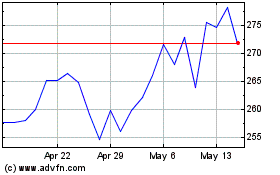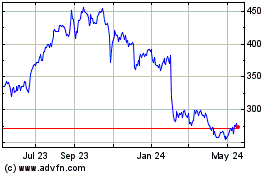The Logic and Potential Pitfalls of a Verizon-Charter Merger
27 January 2017 - 8:59AM
Dow Jones News
By Ryan Knutson and Shalini Ramachandran
Why would the nation's largest wireless carrier want to buy the
nation's second-largest cable company?
As it explores a potential merger with Charter Communications
Inc., Verizon Communications Inc. is signaling that the future of
wireless is in wires.
Unlike cellular networks built over the past three decades,
which rely on tall towers that can cover thousands of people over
miles, next-generation networks will be designed around large
numbers of antennas that cover only a few dozen people. Each of
those antennas needs a wire connecting it back to the internet.
Cable companies, which spent decades stringing wires deep inside
cities to deliver cable TV to homes, are particularly well suited
to supply those connections.
Densely penetrated high-speed wires are especially valuable for
5G, the next evolution in wireless network technology. Verizon,
with 114 million wireless customers, hopes its 5G technology will
enable the wireless delivery of gigabit-per-second speeds,
something currently only possible over wires.
Verizon has a fiber-optic network in nine northeastern states,
and acquiring Charter would greatly expand its footprint. Verizon
recently sold some of its wires in California, Florida and Texas,
but much of that network was made of copper, which isn't useful for
high speeds.
Verizon's interest is preliminary and it's unclear that a deal
will materialize, but a Charter acquisition would be hard for it to
swallow. Verizon has more than $100 billion of debt, and Charter
has about $60 billion. Analysts say the combined company would
likely face a downgrade of its credit rating, which would make
borrowing money more expensive.
Craig Moffett, an analyst at MoffettNathanson, said the debt
hurdle may be enough to prevent a deal from happening.
"Here's the challenge: First Verizon has to figure out how they
would pay for it, and then you would have to think about how you
can get it through the Federal Communications Commission and DOJ,"
he said. "I'm not sure it can make it through the first
hurdle."
The regulatory challenge is no small hurdle, either. Gene
Kimmelman, a former Justice Department antitrust official, said
these types of deals lead to fewer options for internet access and
"create enormous bottlenecks to the free flow of information on the
internet."
Other analysts were equally skeptical. In a note to clients,
Citigroup analysts wrote that the "strategic logic of
Verizon-Charter combination [is] far from compelling." The Citi
analysts believe large parts of Charter's network wouldn't be very
useful for 5G. "Bottom Line: We think it's very unlikely that
Verizon acquires Charter."
The combined company would have roughly 20 million pay-TV
subscribers, thus helping it negotiate better content deals. But
contracts with content providers expire over time so the savings
couldn't be immediately realized. J.P. Morgan analysts pegged
programming cost savings at just $300 million annually. It would
also be difficult for Verizon to realize much savings from
combining its wire-based Fios network with Charter's cables since
they're based on different technologies.
Meantime, Verizon's wireless business is under pressure from
surging rivals. Earlier this week, Verizon reported its third
consecutive quarterly sales decline after six years of growth.
Combing with Charter would also help diversify its revenue
stream.
A deal would further diverge Verizon and AT&T, rivals that
once behaved in near lockstep. Verizon would be close to matching
AT&T's large pay-TV customer base, but it would have a more
robust broadband network. AT&T's 2015 acquisition of DirecTV
didn't add broadband internet infrastructure. And AT&T has
placed a bet on content with its proposed purchase of Time Warner
Inc.
"While they might look vaguely similar on the surface, in
reality they're not remotely the same," Mr. Moffett said. Verizon's
"strategy would seemingly be in support of their wireless business
where AT&T's strategy would seem to be diversify away from
it."
A Verizon-Charter combination would be less about bundling cable
TV, internet and cellphone service into a single package, as
AT&T is doing with DirecTV. Verizon could sell bundles where it
has Fios, but it chooses not to because bundling usually leads to
discounting.
Verizon has also said it isn't interested in investing in the
legacy television business, and instead has been focused on
developing short-form mobile content that appeals to young people.
That mobile video strategy, which involved the launch of its go90
app, has been slow to take off. Verizon recently laid off more than
150 employees in its go90 unit.
(END) Dow Jones Newswires
January 26, 2017 16:44 ET (21:44 GMT)
Copyright (c) 2017 Dow Jones & Company, Inc.
Charter Communications (NASDAQ:CHTR)
Historical Stock Chart
From Jun 2024 to Jul 2024

Charter Communications (NASDAQ:CHTR)
Historical Stock Chart
From Jul 2023 to Jul 2024
